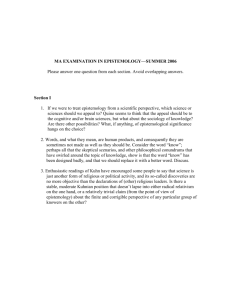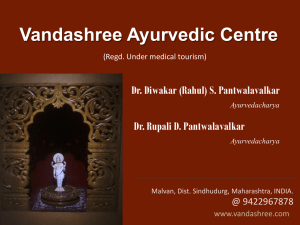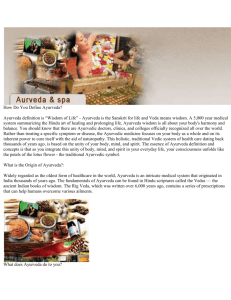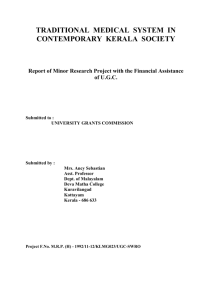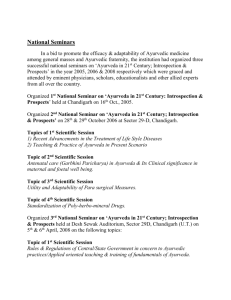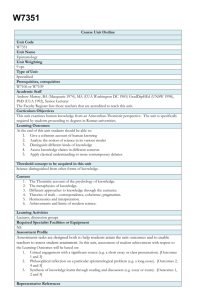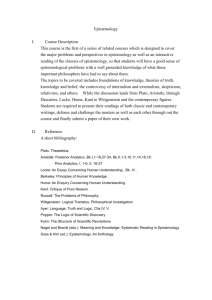The epistemology of the indigenous medical knowledge
advertisement
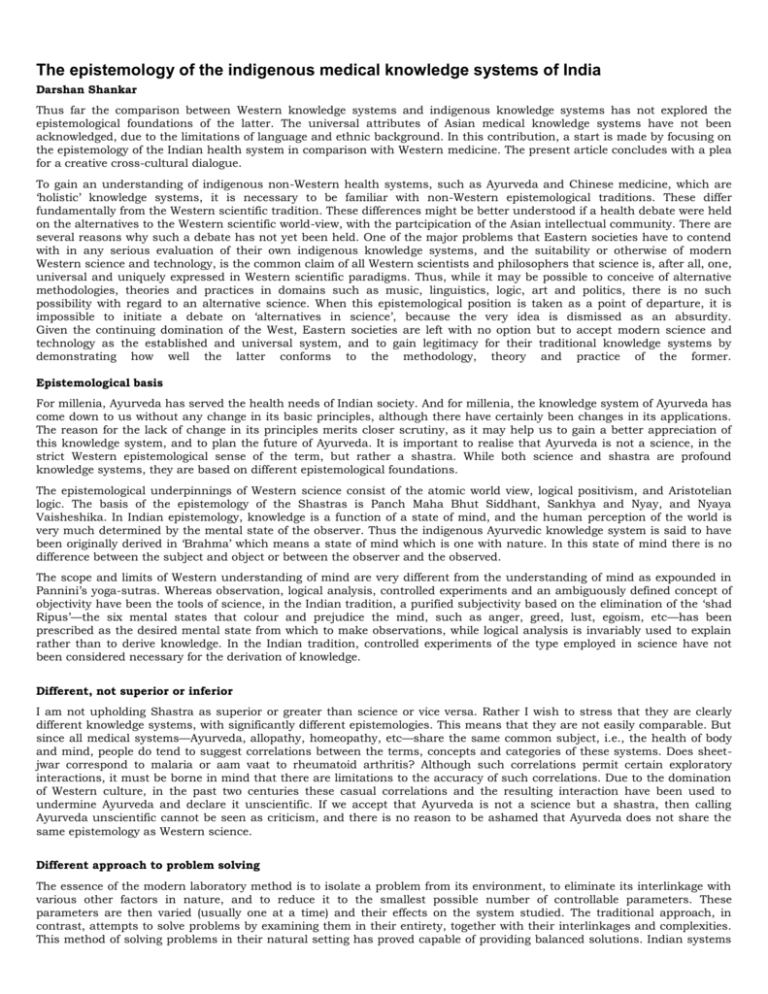
The epistemology of the indigenous medical knowledge systems of India Darshan Shankar Thus far the comparison between Western knowledge systems and indigenous knowledge systems has not explored the epistemological foundations of the latter. The universal attributes of Asian medical knowledge systems have not been acknowledged, due to the limitations of language and ethnic background. In this contribution, a start is made by focusing on the epistemology of the Indian health system in comparison with Western medicine. The present article concludes with a plea for a creative cross-cultural dialogue. To gain an understanding of indigenous non-Western health systems, such as Ayurveda and Chinese medicine, which are ‘holistic’ knowledge systems, it is necessary to be familiar with non-Western epistemological traditions. These differ fundamentally from the Western scientific tradition. These differences might be better understood if a health debate were held on the alternatives to the Western scientific world-view, with the partcipication of the Asian intellectual community. There are several reasons why such a debate has not yet been held. One of the major problems that Eastern societies have to contend with in any serious evaluation of their own indigenous knowledge systems, and the suitability or otherwise of modern Western science and technology, is the common claim of all Western scientists and philosophers that science is, after all, one, universal and uniquely expressed in Western scientific paradigms. Thus, while it may be possible to conceive of alternative methodologies, theories and practices in domains such as music, linguistics, logic, art and politics, there is no such possibility with regard to an alternative science. When this epistemological position is taken as a point of departure, it is impossible to initiate a debate on ‘alternatives in science’, because the very idea is dismissed as an absurdity. Given the continuing domination of the West, Eastern societies are left with no option but to accept modern science and technology as the established and universal system, and to gain legitimacy for their traditional knowledge systems by demonstrating how well the latter conforms to the methodology, theory and practice of the former. Epistemological basis For millenia, Ayurveda has served the health needs of Indian society. And for millenia, the knowledge system of Ayurveda has come down to us without any change in its basic principles, although there have certainly been changes in its applications. The reason for the lack of change in its principles merits closer scrutiny, as it may help us to gain a better appreciation of this knowledge system, and to plan the future of Ayurveda. It is important to realise that Ayurveda is not a science, in the strict Western epistemological sense of the term, but rather a shastra. While both science and shastra are profound knowledge systems, they are based on different epistemological foundations. The epistemological underpinnings of Western science consist of the atomic world view, logical positivism, and Aristotelian logic. The basis of the epistemology of the Shastras is Panch Maha Bhut Siddhant, Sankhya and Nyay, and Nyaya Vaisheshika. In Indian epistemology, knowledge is a function of a state of mind, and the human perception of the world is very much determined by the mental state of the observer. Thus the indigenous Ayurvedic knowledge system is said to have been originally derived in ‘Brahma’ which means a state of mind which is one with nature. In this state of mind there is no difference between the subject and object or between the observer and the observed. The scope and limits of Western understanding of mind are very different from the understanding of mind as expounded in Pannini’s yoga-sutras. Whereas observation, logical analysis, controlled experiments and an ambiguously defined concept of objectivity have been the tools of science, in the Indian tradition, a purified subjectivity based on the elimination of the ‘shad Ripus’—the six mental states that colour and prejudice the mind, such as anger, greed, lust, egoism, etc—has been prescribed as the desired mental state from which to make observations, while logical analysis is invariably used to explain rather than to derive knowledge. In the Indian tradition, controlled experiments of the type employed in science have not been considered necessary for the derivation of knowledge. Different, not superior or inferior I am not upholding Shastra as superior or greater than science or vice versa. Rather I wish to stress that they are clearly different knowledge systems, with significantly different epistemologies. This means that they are not easily comparable. But since all medical systems—Ayurveda, allopathy, homeopathy, etc—share the same common subject, i.e., the health of body and mind, people do tend to suggest correlations between the terms, concepts and categories of these systems. Does sheetjwar correspond to malaria or aam vaat to rheumatoid arthritis? Although such correlations permit certain exploratory interactions, it must be borne in mind that there are limitations to the accuracy of such correlations. Due to the domination of Western culture, in the past two centuries these casual correlations and the resulting interaction have been used to undermine Ayurveda and declare it unscientific. If we accept that Ayurveda is not a science but a shastra, then calling Ayurveda unscientific cannot be seen as criticism, and there is no reason to be ashamed that Ayurveda does not share the same epistemology as Western science. Different approach to problem solving The essence of the modern laboratory method is to isolate a problem from its environment, to eliminate its interlinkage with various other factors in nature, and to reduce it to the smallest possible number of controllable parameters. These parameters are then varied (usually one at a time) and their effects on the system studied. The traditional approach, in contrast, attempts to solve problems by examining them in their entirety, together with their interlinkages and complexities. This method of solving problems in their natural setting has proved capable of providing balanced solutions. Indian systems seek to systematise common sense, and to make it rigorous rather than to destroy the essential unity of its multifacetedness. Thus, according to Charaka, the shastra is dependent upon yukti, that is, the intellect that perceives the phenomena created by the coming together of a multiplicity of causes, which in their turn make up the phenomena. Again, having perceived the multiplicity of causes behind a particular phenomenon, yukti is needed in order to bring together the appropriate actions and materials at the appropriate time and place. Thus the traditional system, even in its theoretical formulation, seeks to make possible a healthy life in this world, rather than to dissect it or bringing about major changes. It will be clear that while traditional knowledge is indeed built upon a overwhelming amount of detailed and minute observation, ‘experiment’ in the modern laboratory sense of the term does not have a clear counterpart in this tradition. Perspective on quantification Although measurement and quantification are an important part of indigenous systems of medicine, they differ in form from the modern systems. Most measurements in the traditional sciences are made using units ‘normalised’ to an individual. Thus when a person’s height or the length of his or her limbs is assessed, the measurement is expressed in units of anguli, the dimensions of a finger of the individual involved, rather than by means of an arbitrary standard external to the individual, such as the international metre. Such normalised units exist to measure volume and time, as well as length. In yoga Cintamani, for instance, a matra of time has been defined as the time taken by a sleeping individual to complete one cycle of breathing—one inhalation and one exhalation. Although measurement and quantification have their place in indigenous systems of medicine, their importance is somewhat limited in comparison with modern systems. In India it is not the geometry of Elucid but the asthadhaayi of Pannini that is considered to be the supreme example of the construction of theory. Indian knowledge systems are based on the understanding that numbers and symbols are not essential in order to achieve scientific rigour, but rather the technical use of natural language. Sanskrit, for instance, has proved to be versatile enough for highly abstract and technical topics such as logic, mathematics and vedanta. Recent research indicates that this method of using natural language to express a depth of understanding may also have powerful applications in computer sciences. What is needed We have seen that correlating concepts, approaches and perspectives reveals differences, if not difficulties. Such difficulties are only to be expected in cross-cultural endeavours and come as no surprise to those medical professionals aware of the plurality of cultures and their varied scientific expression. These are problems that must be faced and resolved by serious practitioners of comparative research. There is an urgent need to legitimise serious cross-cultural medical research. Schools for comparative medical research need to be established. There a creative dialogue can be initiated by medical professionals, based on the fundamental issues related to the epistemology and philosophy of science. A comparative framework is needed, which can serve as a bridge. Only then will we be able to resolve the differences between the knowledge structures of the Eastern and the Western system. But even before a dialogue with Western knowledge systems is initiated, Asian scholars must establish their own dialogue, in order to establish a non-Western paradigm of knowledge, based on shared cultural exchanges. A mono-cultural view of the world, dominated by Western science, must be challenged if the knowledge systems of other cultures are to flourish and to contribute to the world of knowledge. Darshan Shankar Foundation for Revitalisation of Local Health Traditions No. 50 MSH Layout, Anandnagar Bangalore - 560 024 India Email: root@frlht.ernet.in Highlights Eastern societies are to gain legitimacy for their traditional knowledge systems by demonstrating how well they conform to Western science In Indian epistemology, knowledge is a function of a state of mind Indian tradition prescibes a purified subjectivity as the desired mental state from which to make observations Does sheet-jwar correspond to malaria or aam vaat to rheumatoid arthritis? The traditional approach attempts to solve problems by examining them in their entirety Asian scholars must establish their own dialogue © copyright Nuffic-CIRAN and contributors 1996.
